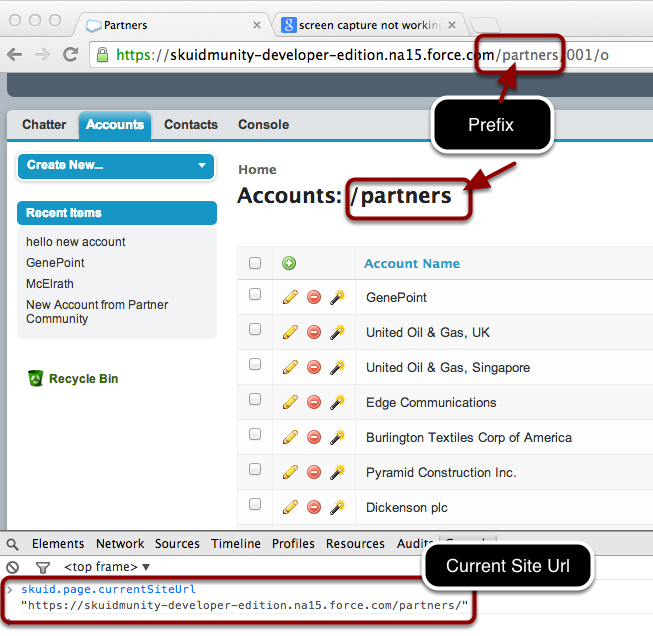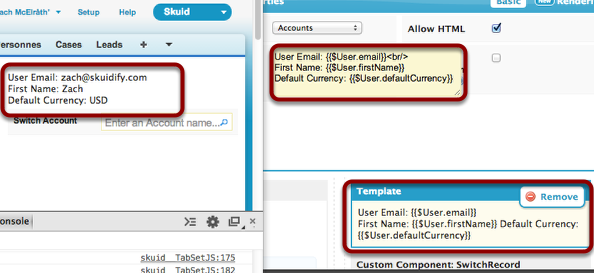Global Merge Variables / Functions¶
Global Merge variables are available in ANY Merge context, and all start with $, e.g. {{$Param.accountId}}, {{$Api.Session_Id}}. The following is a complete list of global variables available for use in Skuid.
When configuring Skuid data sources and authentication providers, additional merge variables are added to the Merge API that allow you to access information about the data source’s authentication configuration and current state.
There are a number of places in data source and authentication provider configuration that process Skuid’s Merge API, which we’ll give examples of here as well.
Index of all global merge variables / functions¶
Global Variables
- $Api: for accessing the running user’s Session Id, User Id, and Partner/Enterprise Server Urls. Corresponds to Visualforce $Api.
- $Label: retrieves the translation of a Custom Label requested by the running Skuid Page. Corresponds to Visualforce $Label or Apex System.Label
- $Model: access to JavaScript representation of a specific Skuid Model by Name.
- $Param: for accessing URL Parameter values for the current page. Corresponds to Visualforce $CurrentPage.parameters
- $Site: access to information about the Force.com site that the current Skuid Page is running on. Corresponds to a subset of Visualforce $Site.
- $User: data about the the running user. Corresponds to Visualforce $User and Apex UserInfo.
Global Functions
- urlEncode / encodeUrl: for URL-encoding merge data so that it can be safely added to a URL. Equivalent of JavaScript’s encodeURIComponent function. Example: /apex/skuid__UI?page=LeadsWithCompanyName&companyname={{#urlEncode}}{{companyName}}{{/urlEncode}}
- urlDecode / decodeUrl: for decoding URL-encoded merge data. Equivalent of JavaScript’s decodeURIComponent function. Example: {{#urlDecode}}{{$Param.companyname}}{{/urlDecode}}
$Api¶
Intended to correspond fairly one-to-one with the Visualforce $Api global variable. Exposes the following properties:
- $Api.Session_Id: The Visualforce Session Id of the running user.
Note
This is NOT the same as the Session Id returned by native Salesforce pages, on domains such as na*.salesforce.com. Generally this is irrelevant for Api integrations, but it can be a problem when trying to run / access Salesforce Reports from an external system. Available in JavaScript via sforce.connection.sessionId.
- $Api.User_Id: The 18-digit Id of the running user. Available in JavaScript via skuid.utils.userInfo.userId.
- $Api.Organization_Id: The 18-digit Id of the current Salesforce organization / instance. Available in JavaScript via skuid.utils.userInfo.organizationId.
- $Api.Partner_Server_Url: The Url that is needed for 3rd-party integrations to call-in to the current Salesforce instance via the Salesforce Partner API, for the latest API version of Salesforce supported by Skuid. Example:
https://c.na11.visual.force.com/services/Soap/u/29.0/00DG0000000XHQa. Available in JavaScript via sforce.connection.partnerServerUrl. - $Api.Enterprise_Server_Url: The Url that is needed for 3rd-party integrations to call-in to the current Salesforce instance via the Salesforce Enterprise API, for the latest API version of Salesforce supported by Skuid. Example:
https://c.na11.visual.force.com/services/Soap/c/29.0/00DG0000000XHQa. Available in JavaScript via sforce.connection.enterpriseServerUrl. - $Api.Partner_Server_Urls: A map containing all Partner Server Urls for past API versions of Salesforce starting with API v3, keyed by the integer version of the Api. Example: using $Api.Partner_Server_Urls.29 would return the same thing as $Api.Partner_Server_Url above, whereas $Api.Partner_Server_Urls.3 would return something like
https://skuid.na11.visual.force.com/services/Soap/u/3.0/00DG0000000XHQa%22. Available in JavaScript via sforce.connection.partnerServerUrls. - $Api.Enterprise_Server_Urls: A map containing all Partner Server Urls for past API versions of Salesforce starting with API v3, keyed by the integer version of the Api. Example: using $Api.Partner_Server_Urls.29 would return the same thing as $Api.Partner_Server_Url above, whereas $Api.Partner_Server_Urls.3 would return something like
https://skuid.na11.visual.force.com/services/Soap/c/3.0/00DG0000000XHQa. Available in JavaScript via sforce.connection.enterpriseServerUrls.
$Label¶
Used to retrieve the translated value of a custom label . Skuid internally requests various custom labels, e.g. “save”, “cancel”, “delete”, so that Skuid’s UI can be translated into any language by end users (Skuid ships with translations into Spanish and French of all end-user-facing components).
To use any custom label in a Skuid page, the label must be specified within the Label tab of that page. After doing so, request a label using the $Label merge variable.
For example, a custom label named “label_name” would be referenced with $Label.label_name.
Warning
In most cases, custom labels must not be marked as a protected component. Doing so will disallow the label from being referenced in a different namespace—including Skuid. If you are seeing issues with including your labels, try unmarking this property.
Note
Labels must be requested by their API Name, case-insensitive. However, whatever syntax you use to request a label will determine how it is accessible via JavaScript and via the $Label merge variable. For instance, suppose you have a Custom Label with API Name “Hello_World”.
When requesting a Label from a Skuid Page, you can enter “HeLLo_WoRld”, “hello_world”, “HELLO_WORLD” — all of these will retrieve the correct Custom Label. But you will only be able to request a Label by the Name you used, e.g. if you requested Label “hello_world”, then ONLY $Label.hello_world will work; $Label.HELLO_WORLD will not work.
This can be very useful for internationalizing parts of your Skuid Page, e.g. the labels of Tabs, Sections in a Field Editor, Buttons, or text in Templates, Page Titles, or even Filter Labels.
For more information, see the label localization topic.
$Model¶
A direct reference to the JavaScript representation of a Model, by Model Name. Use this to access data in particular Model rows, metadata for the Model, metadata for a Model’s fields, or particular settings for a Model, e.g. the number of records retrieved in the Model:
For instance, let’s say you have an “OpenTasks” Model, configured like this:
- Fields: Subject, Status, Priority, WhoId, Who.Name, WhatId, What.Name, Secondary_Owner__c
- Conditions: (1) Status = “New”, (2) OwnerId = (userinfo) User Id
- Limit: 100
You could then use $Model.OpenTasks to get a reference to the JavaScript API for this Model. For a full reference into what this returns, we recommend that you go into your browser’s JavaScript Console and do skuid.model.getModel(‘OpenTasks’) and check out what is returned — all of this data is available via $Model.OpenTasks! Just remember that in Skuid Merge Syntax / MustacheJS, object property navigation is via the . operator (period), not via brackets. We often find ourselves doing $Model.MyModel.data[0], which is valid JavaScript but NOT valid curly bracket (“mustache”) merge syntax — here you would need to use $Model.MyModel.data.0 instead.
Here are some examples of information that you could retrieve, in specific categories:
Accessing data in the Model
$Model.OpenTasks.data.length – e.g. 18, the number of records actually in the Model’s data array, which contains all records retrieved by the Model’s underlying SOQL query
This value is returned as an integer. So for a model with one row, the following formula will be true:
{{$Model.NewModel.data.length}} = 1Warning
In previous versions of Skuid, this value was a string. If your formulas or snippets use this merge variable ensure it is interpreted as an integer.
For example:
{{$Model.NewModel.data.length}} = “1”The above formula will return false.
$Model.OpenTasks.data.0.Status – e.g. New, the value of the Status field for the 1st record in the OpenTasks Model.
$Model.OpenTasks.data.0.Id – e.g. 00T000000000a7bAAA, the 18-digit Id of the 1st record in the OpenTasks Model
$Model.OpenTasks.data.0.Id15 – e.g. 00T000000000a7b, the 15-digit Id of the 1st record in the OpenTasks Model. Often necessary for passing data into standard Salesforce page layouts.
Accessing Model Conditions
- $Model.OpenTasks.conditions.0.value – e.g. ‘New’, the current value of the 1st Condition in the Model
- $Model.OpenTasks.conditions.0.inactive – will be false if the Condition is currently active, true if it is inactive
- $Model.OpenTasks.conditions.1.field – e.g. ‘OwnerId’, the field for the 2nd Condition in the Model
- $Model.OpenTasks.conditions.1.name – if the Condition is Filterable On/Off, then this will return the Condition’s unique name
Metadata for the Model’s SObject
- $Model.OpenTasks.accessible – e.g. true, whether or not the running user has Read permission on the Task object
- $Model.OpenTasks.createable – e.g. true, whether or not the running user has Create permission on the Task object
- $Model.OpenTasks.updateable – e.g. true, whether or not the running user has Edit permission on the Task object
- $Model.OpenTasks.deleteable – e.g. false, whether or not the running user has Delete permission on the Task object
- $Model.OpenTasks.label – e.g. Task, the translated Label of the Model’s SObject
- $Model.OpenTasks.labelPlural – e.g. Tasks, the translated plural Label of the Model’s SObject
Metadata for Fields requested in the Model
- $Model.OpenTasks.fieldsMap.WhoId.label – e.g. Contact/Lead Id, the Label of the WhoId field on the Task object
- $Model.OpenTasks.fieldsMap.Secondary_Owner__c.inlineHelpText – e.g. A backup owner to takeover if the primary Owner fails to complete this task, the Inline Help Text defined for the particular field
- $Model.OpenTasks.fieldsMap.Status.picklistEntries.2.label – e.g. Completed, the Label of the 2nd picklist entry defined for the Status field on the Task object
Model properties / settings
- $Model.OpenTasks.recordsLimit – e.g. 100, the number of records requested by the Model
- $Model.OpenTasks.soql – e.g. select Subject, Status, Priority, WhoId, Who.Name, WhatId, What.Name, Secondary_Owner__c from Task where Status = ‘New’ and OwnerId = ‘005000000000AChAAB’ limit 100, the actual SOQL run by the Model’s query
$Param¶
A keyed map of all URL query string parameters for the current page. A window into the Skuid JavaScript object skuid.page.params.
Syntax:
$Param.<parameterName>
For instance, if your page URL looks like this:
https://skuid.na11.visual.force.com/apex/skuid__ui?page=AccountDetail&id=001G000000qI8REIA0
Then you would be able to do the following:
- $Param.page –> “AccountDetail”
- $Param.id –> “001G000000qI8REIA0”
$Site¶
Provides information about the Force.com Site that the current Skuid Page is running on, if applicable. Provides a very limited subset of the variables exposed via Visualforce’s $Site global variable.
- $Site.CurrentSiteUrl –> e.g. “https://skuidmunity-developer-edition.na15.force.com/partners/”, the base URL for your Force.com site or Salesforce community.
- $Site.Prefix –> e.g. “/partners”, if “partners” is your Force.com site or Salesforce community’s prefix, or “” if there is no Prefix.
Note
Looking for the Skuid JavaScript API equivalent of these values?
$User¶
Provides information about the running user viewing the page. A direct window into the Skuid JavaScript object skuid.utils.userInfo, which contains most of the properties available in System.UserInfo in Apex, or the $User Global Variable in Visualforce. These properties are camel-cased, so they generally start with a lower-case, then, if they are multi-word, the successive words are upper-case, e.g. $User.userName, $User.email, $User.defaultCurrency
- $User.userId –> the 18-digit User Id of the running User. Same as $Api.User_Id.
- $User.sessionId –> the Session Id of the running User. Same as $Api.Session_Id.
- $User.organizationId –> the 18-digit Id of the current Salesforce Organization. Same as $Api.Organization_Id.
- $User.organizationName –> the Company Name of the current Salesforce Organization, e.g. “Acme Recruiting Inc.”
- $User.profileId –> the 18-digit Id of the running User’s Profile, e.g. “00eG0000000143nuLIAQ”.
- $User.userRoleId –> the 18-digit Id of the running User’s Role, or null if the User has no role, e.g. “00EG000000th3bMAA”.
- $User.firstName –> the First Name of the running User, e.g. “Tanya”
- $User.lastName –> the Last Name of the running User, e.g. “Johnson”
- $User.name –> the Full Name of the running User, e.g. “Tanya Johnson”
- $User.email –> the email address of the running User, e.g. “tanya.johnson.3743@gmail.com”
- $User.userName –> the User Name of the running User, e.g. “tjohnson@acme.com”
- $User.locale –> the User’s specified Locale’s key, e.g. “en_US”, “zh_CN”, “fr_FR”
- $User.language –> the User’s specified Language’s key, e.g. “en_US”
- $User.defaultCurrency –> the Default Currency for the running User, e.g. “USD”, “GBP”.
- $User.callCenterId –> the running User’s associated Call Center record, if configured.
- $User.userType –> e.g. “Standard”
- $User.isAuthenticated –> boolean. True if the running User is an authenticated, named user, false if in an unauthenticated context, e.g. if the running user is a Site Guest User.

